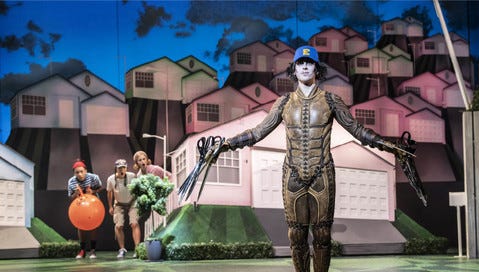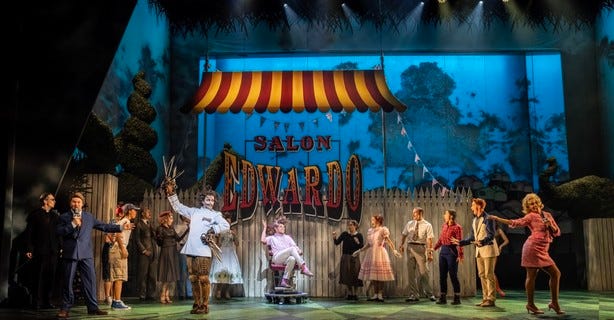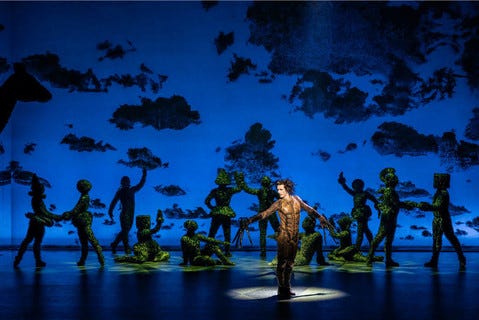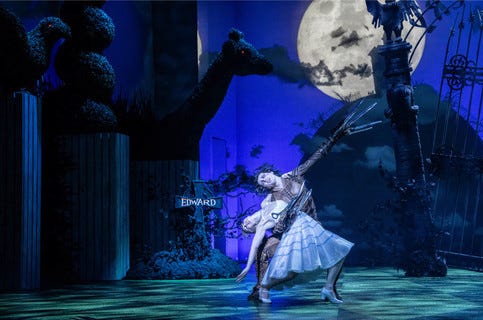Matthew Bourne’s Edward Scissorhands is from the classic Tim Burton movie and features the hauntingly beautiful music of Danny Elfman and Terry Davies. Bourne and his New Adventures Company return to this bittersweet gothic fairytale.
It tells the story of Edward, who lives high above the town in a castle with his eccentric inventor father. When the inventor dies unexpectedly, Edward is left alone and unfinished with only scissors for hands. He wanders down to the town in search of food one night and is taken in by a kind woman there. She gives him her daughter’s room while she is away and befriends him, seeing the gentleness inside his outward appearance. The town begins to adapt to Edward and accept him. They see his strengths - giving him hedges to trim and hair to cut. However, the local teens still mock and ostracise him; despite the kindness of some, Edward is still an outsider. He loves Kim, the daughter of the woman who took him in, but in a bittersweet tale, his love is never returned, and he is never truly accepted by the town.
The re-interpretation via dance works impeccably well in this story. Befitting Bourne’s instinct for stories that can be transformed this way, making Edward mute only adds to the feeling of isolation and seeing the world through his eyes. Such, too is the physicality of Liam Mower as Edward. We feel the emotions he goes through with just the slightest gesture. The way he uses the scissors to express emotion is beautiful and subtle. His dancing is unmatched too, and giving Edward, weighed down by his hands and his cumbersome-looking body suit, such a light way of moving when he dances again shows us the Edward inside that he’s trying to convey.
One element that perhaps the adaptation struggles with is conveying what does need dialogue or exposition. While comparing difficult productions is reductive in some ways, Bourne’s others, like Swan Lake, Sleeping Beauty or Cinderella, benefit from shared cultural memory and shorthand (or, in Swan Lake’s case, the existing choreography to build on). However, despite the film working well in adaptation, elements of storytelling and exposition don’t work through dance and are presented in more mimed movement scenes. While effective, often funny, and always clear, it slows down the pace and occasionally leaves longer swathes of the show without ‘proper’ dance numbers. However, it’s a minor niggle, and a necessary one to convey the story in full. And a credit to the performers who do so with clarity and heart.
In the typical Bourne style, the piece is fused with humour and personality, and each ensemble character, who remains fairly fixed in this piece to their particular townsperson, is filled with personality. Each has a ‘family’ they belong to, whether it’s the dour church-loving family, the gay couple with a baby, or the seductress next door. Each is given a time to shine, conveying personality through their movement. And while at times the townsfolk are the ‘enemy’ as we root for Edward, they are also witty, engaging and fun to watch.
Staged too against the contrasting bubblegum town and the darker cemetery and castle. The staging is not perhaps as extravagant as some of Bourne’s other shows, but the simplicity of town colour versus the gothic dark of Edward’s original home works well. It’s actually at its best when stripped back to simpler staging and just the dancers. Be that the ‘Topiary ballet’ or the beautifully moving ice sculpture dance. Once again, the company is the piece's strength, and the design works well with that.
The show's heart is Liam Mower, as Edward, and is particularly complimented by Ashley Shaw, as Kim. But it’s Mower’s heartfelt performance that truly makes this production. From his naive vulnerability and fear when venturing into the town. From his openness and joy when he’s accepted to his longing and love for Kim, Mower makes us feel every aspect of Edward’s emotions, his evolution and acceptance, as well as heartbreak and pain.
Edward Scissorhands is an unexpectedly moving show, particularly for anyone who has ever been an outsider. Edward’s experiences mirror those of anyone who has ever been excluded from life for whatever reason. His vulnerability, and the way through it all he remains honest and earnest in his intentions. We see how he is taken advantage of and used by the and townsfolk and cast aside when he’s challenged. Edward feels like the experience of everyone who looks different might think differently or behave outside of the norm. And it’s so powerful for that. From the moment he’s brought into the house and welcomed to the moment he’s excluded, many of the audience will feel that journey so deeply with him.
In the end, we get to celebrate to feel a little hope, as Edward, during the curtain call gets to ‘see’ the audience and make it snow on them. To experience joy and acceptance while finding love in that moment. It’s a beautiful meta-theatrical coda to the story that leaves us with hope for Edward and for us outsiders too.
In Cardiff until 23rd March 2024
WMC Tickets here.
Then on tour nationwide. Information here.
Presented by New Adventures, Martin McCallum and Marc Platt
Devised, directed and choreographed by Matthew Bourne
New music and arrangements by Terry Davies
Based on themes from the original motion picture score composed by Danny Elfman
Based on the original motion picture by arrangement with 20th Century Studios
Original story and motion picture directed by Tim Burton
Original screenplay, story and co-adaptation by Caroline Thompson
Designed by Lez Brotherston
Lighting designed by Howard Harrison
Sound designed by Paul Groothuis
By Special Arrangement with Buena Vista Theatricals






